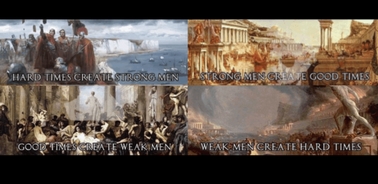- Home
- News And Events
- What’s Going On
- On The Decline Of Civilizations
On the Decline of Civilizations

Ignacio de la Torre, IE Master in Finance Academic Director. Originally Published in El Confidencial.
In a viral “meme” that circulates on WhatsApp, one can see at the uppermost part of the image a group of Roman legionaries crossing the Alps with the legend “hard times create strong men”. The picture immediately below shows the splendour of the Roman civilization with the boom of the city-states and the text “strong men create good times”. The third picture displays a bacchanal (feasts in honour of Bacchus, the god wine, where traditionally both booze and orgiastic sex converged); the text reads “good times create weak men”. Finally, the fourth picture presents the Vandal peoples’ assault on Rome and a partially destroyed city alongside the words “weak men create hard times”. Thus, pointing out how the end of a cycle gives way to the beginning of a new one.
The shock caused by the fall of the Western Roman Empire to barbarian tribes who were thought of as less developed was gigantic. However, the first historian who dared to perform an extensive work about the essence of the downfall of civilizations was the Tunisian Ibn Khaldun, a son of Sevillians who fled after the Reconquista in the XIV century. Khaldun was perplexed by the great Roman cities in the North of Africa and wondered how could the Berber tribes and the Vandals who had come from the North by sea had been able to overpower Rome. His work “Muqaddima” (Introduction to Universal History) presents an overview of the common elements that mark the decline of a civilization. The essential concept he uses is “social cohesion” (“asabiya”, in Arabic). According to him, when societies become opulent, they start losing part of their “asabiya”, to the point that they start to become decadent despite the apparent opulence surrounding them. Consequently, at some point “inferior” civilizations but with higher social cohesion can bring down decadent civilizations with low cohesion in a relatively fast way.
Up to now in the 21st century, the recently deceased Jewish thinker Jonathan Sacks said a few shocking words in his 2016 Templeton Award:
Ibn Khaldun, Giambattista Vico, Stuart Mill, Bertrand Russell, Will Durant... They have all kept saying the same thing: that civilizations begin to die when they lose the moral passions that once shaped them. It happened in Greece and Rome, and it can happen again to the West. The signs are a falling birth rate, decay in morals, an increase in inequality, constant self-indulgence of the rich, the hopelessness of the poor, ostracized minorities, the inability of making immediate sacrifices for the sake of future generations and a loss of faith in the old beliefs without a new value scheme to substitute them. These are dangerous flags and most of them are swelling nowadays.
It has been now seven centuries since Khaldun’s texts and almost sixteen since the fall of the Western Roman Empire. Nonetheless, Sachs’ words seem to be as relevant as ever. There is no doubt that the prosperity achieved during the reconstruction period after the Second World War promoted an economic resurge and a social state that endured the growth of the middle classes and their affinity with the democratic system. This model has been aching since the mid-70s due to the challenges and advantages brought upon by the fourth industrial revolution. Ever since then, we have carried on progress, although, at a slower pace than our parents did. Besides, progress has become increasingly volatile thanks to the specialized set of skills required for this industrial revolution. This creates a huge disparity in wages, which is the genesis of the greatest inequalities of income and wealth. Lastly, the revolution has focused the creation of high-paying jobs to be only in big cities, which translates to a disproportionate economic growth and the migration of young workers from their ancient homes to the metropolis creating a “red effect” of high productive and high paying jobs. The consequence of these factors is a deep loss of “social cohesion”.
I do not demonize the technological revolution. It is real and it has huge advantages (such as the messenger RNA vaccines against Covid-19), but we have failed to stop and analyze the possible answers. Populists raise their flags high by proposing simple solutions to complex issues (like building a wall in Texas or modifying borders), however, a complex phenomenon always requires a complex solution and there is a lot at stake.
This time, however, I am amazed that unlike the V century I cannot quite find other highly cohesive civilizations. China and Russia are on their way to a deep “demographic suicide” (using Alejandro Macarrón’s coined expression). India has already moved to a fertility rate of two children per woman, which does not ensure generational replacement and Islam faces deep political, religious and legal divides.
The question here, as it always is in history, is how do we react to such sizeable problems? Spengler wrote “The Decline of the West” in 1917, more than a century ago, and we are still debating decadence. In any case, our reaction to such enormous challenges must come from the premise of courage. As Upton Sinclair said:
“Our deliverance was won with pain and suffering and can be lost through our cowardice.”